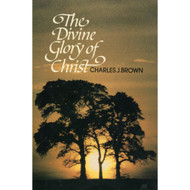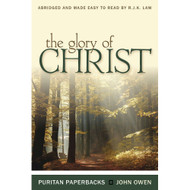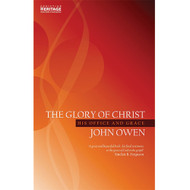Categories
Categories
The Glory of Christ
Product Description
In The Glory of Christ, here abridged and made easy to read, we have the great Puritan pastor and theologian John Owen at his richest and most mature. Here he writes about Jesus Christ, the heart of the gospel. Owen himself tells us that the substance of the work began in his own private meditation and study and only later was shared with his congregation. Here, then, is a master theologian writing about the things, or better, the person, nearest to his heart. The work itself was composed almost at the end of Owen’s life and first published in 1684, the year after his death. Indeed, the material in chapters fifteen to seventeen of this abridgement appeared for the first time in the second edition of 1696, having been found among Owen’s papers only after his death but clearly intended as the closing section of the work.
On the day of Owen’s death (24 August 1683) William Payne, a minister in Saffron Walden who had accepted responsibility for seeing the manuscript of this work through to publication, visited him in Ealing (now part of London) to share the good news that Meditations on the Glory of Christ was now going through the press. Owen’s biographers record his memorable and beautiful reply:
I am glad to hear it; but, O brother Payne! the long-wished-for day is come at last, in which I shall see that glory in another manner than I have ever done, or was capable of doing in this world.
It is clear from these pages that Owen had already seen the glory of Christ from afar and pondered long on its significance. His teaching is well-suited to bring us to share in his longing to know Christ better, to see his glory more clearly and to serve him more faithfully. It is the conviction of the publisher that many readers will discover this book to be one of the hidden treasures of Christian literature and will return to it again and again for instruction and spiritual refreshment.
Table of Contents
| Publisher’s Preface | v | |
| 1 | Seeing Christ’s Glory | 1 |
| 2 | Christ’s Glory as God’s Representative | 11 |
| 3 | The Glory of Christ in His Person | 27 |
| 4 | The Glory of Christ’s Humbling Himself | 37 |
| 5 | The Glory of Christ’s Love as Mediator | 49 |
| 6 | The Glory of Christ’s Work as Mediator | 57 |
| 7 | The Glory of Christ’s Exaltation | 63 |
| 8 | The Glory of Christ under the Old Testament | 69 |
| 9 | The Glory of Christ’s Union with the Church | 75 |
| 10 | The Glory of Christ’s Giving Himself to Believers | 83 |
| 11 | The Glory of Christ in Restoring All Things | 93 |
| 12 | The First Difference between Beholding the Glory of Christ by Faith and by Sight | 103 |
| 13 | The Second Difference between Beholding the Glory of Christ by Faith and by Sight | 113 |
| 14 | The Third Difference between Beholding the Glory of Christ by Faith and by Sight | 127 |
| 15 | Exhortation to Unbelievers | 133 |
| 16 | How to Recognize Spiritual Decay in the Soul | 147 |
| 17 | How the Soul may be Recovered from Spiritual Decays | 167 |
About the Author
John Owen was born in 1616 in Stadhampton, Oxfordshire and died in Ealing, West London, in 1683. During his sixty-seven years he lived out a life full of spiritual experience, literary accomplishment, and national influence so beyond most of his peers that he continues to merit the accolade of ‘the greatest British theologian of all time.’
No outline of Owen’s life can give an adequate impression of the stature and importance to which he attained in his own day. He was summoned to preach before Parliament on several occasions, most notably on the day after the execution of Charles I. During the Civil War, Owen’s merit was recognized by General Fairfax, then by Cromwell who took him as a Chaplain to Ireland and Scotland. He was adviser to Cromwell, especially though not exclusively on ecclesiastical affairs, but fell from the Protector’s favour after opposing the move to make him King. In 1658 he was one of the most influential members of the Savoy Conference of ministers of Independent persuasion. After the Ejection he enjoyed some influence with Charles II who occasionally gave him money to distribute to impoverished ejected ministers. All in all, he was, with Richard Baxter, the most eminent Dissenter of his time.
Despite his other achievements, Owen is best famed for his writings. These cover the range of doctrinal, ecclesiastical and practical subjects. They are characterized by profundity, thoroughness and, consequently, authority. Andrew Thomson said that Owen ‘makes you feel when he has reached the end of his subject, that he has also exhausted it.’ Although many of his works were called forth by the particular needs of his own day they all have a uniform quality of timelessness. The Trust has reprinted his Works in twenty-three volumes.
 Loading... Please wait...
Loading... Please wait... 









